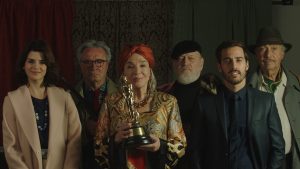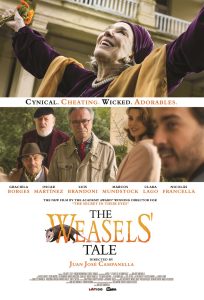‘The Weasels’ Tale’ details the rigors of personal integrity
“The Weasels’ Tale” (“El cuento de las comadrejas”) (2019 production, 2020 release). Cast: Graciela Borges, Oscar Martínez, Luis Brandoni, Marcos Mundstock, Clara Lago, Nicolás Francella, Luz Cipriota, Anwar Yoma, Manuel Martínez Sobrado, Ayelén Dotti, Nicolás Fiore, Adriana Marcela Garibaldi, Dana Gabriela Basso. Director: Juan José Campanella. Screenplay: Juan José Campanella, Augusto Giustozzi, Darren Kloomok and José A. Martínez Suárez. Source Material: Augusto Giustozzi and José A. Martínez Suárez, screenplay, “Los muchachos de antes no usaban arsénico” (“The Boys Before Didn’t Use Arsenic”). Web site. Trailer.
Operating from a standpoint of integrity can be difficult enough under the best of conditions, but, when extenuating circumstances adversely impinge upon it, that can make matters much more challenging. Indeed, it can be hard to remain respectable and forthright when conditions become demanding or menacing, threatening our interests or even our survival. But even making an honorable attempt at doing so can assuage any ill feelings we might have about our level of conscientiousness, yielding results that could prove ennobling or even rewarding. Such are the circumstances facing a group of vulnerable seniors in the new dark comedy, “The Weasels’ Tale” (“El cuento de las comadrejas”).
Life is not what it used to be for a quartet of aging Argentinean movie industry veterans. The once-famous cinematic icons live together under tenuous conditions on a rundown rural estate outside of Buenos Aires, making ends meet mainly through pension income, their entertainment fortunes having been frivolously squandered. And, even though the four colleagues have known each other for years, they frequently get on each other’s nerves, trading barbs and pushing their fellow residents’ respective buttons.

Once-famous leading lady Mara Ordaz (Graciela Borges) desperately tries to hold on to past glory during her sunset years in director Juan José Campanella’s “The Weasels’ Tale” (“El cuento de las comadrejas”). Photo courtesy of Outsider Pictures.
So who make up this cantankerous foursome? The matron of the household is Mara Ordaz (Graciela Borges), a glamorous former leading lady who spends most of her time watching her old films when she’s not overacting for her housemates or grasping to hold on to her reality (not unlike Norma Desmond (Gloria Swanson) from “Sunset Boulevard” (1950)). Mara is married to Pedro De Córdova (Luis Brandoni), a wheelchair-bound former actor who strived for (but never attained) the fame of his wife, especially once he was injured in a serious car accident; he now spends his days plying his talents as a would-be painter and sculptor, displaying about as much virtuosity at this as he did as an actor. The long-married couple is joined by Norberto Imbert (Oscar Martínez), an acerbic-tongued director of several of Mara’s past projects who now has a penchant for shooting the wildlife (mostly rats and weasels) overrunning the estate, and Martín Saravia (Marcos Mundstock), a once-brilliant screenwriter who fell on hard times after producing a controversial left-leaning documentary during the Argentine Dirty War of the 1970s, leaving him blacklisted and forced to pen inane projects like “Gertrude the Goose is on the Loose.” Norberto and Martín came to live in the house years ago when Mara extended an invitation to them to move in with their respective wives, Stella (Adriana Marcela Garibaldi) and Elvira (Dana Gabriela Basso), Mara’s sister and best friend, respectively. But, when Stella and Elvira mysteriously disappeared and died, Norberto and Martín stayed on, even if not formally invited to do so.
The estate on which Mara, Pedro, Norberto and Martín live is almost as much a character in the story as the four principals. It may not be much to look at, and it may be falling apart, but it is nevertheless home to its argumentative residents, even if they frequently complain about it – and one another. Yet, quite unexpectedly one day, it takes on a new significance that no one saw coming.
During one of their many grousing sessions, Mara, Pedro, Norberto and Martín receive unexpected visitors. While sitting on their front porch, the foursome is greeted by the arrival of two young, well-dressed visitors driving a nice car, Francisco (Nicolás Francella) and Bárbara (Clara Lago). They claim to be lost and running late for an important meeting in Buenos Aires. They ask to use the phone to get directions, and, when Bárbara makes her call, she learns that the meeting has been canceled.

Once-famous leading lady Mara Ordaz (Graciela Borges, right) is an easy mark for smooth-talking con man Francisco Gourmand (Nicolás Francella, left) in the deviously delicious dark comedy, “The Weasels’ Tale” (“El cuento de las comadrejas”), now available for online streaming. Photo courtesy of Outsider Pictures.
While all this unfolds, Francisco suddenly realizes whose company he and Bárbara find themselves in. As a longtime fan of Mara’s work, Francisco gushes about her movies, lavishing her with praise that she eats up. And the more Mara swoons over the unsolicited compliments, the more Francisco and Bárbara skillfully manage to slip in additional requests for favors, most notably to tour the house and surrounding property. Mara gladly obliges, but the others smell a rat and turn a skeptical eye toward their uninvited guests.
The longer the visit goes on, the more Francisco sweet-talks Mara about her work and her talent – and how she should really consider making a triumphant return to the silver screen, something she has been secretly desiring for years. To do that, however, Francisco suggests that she needs to raise her public profile more, returning to the spotlight and becoming more visible, the sort of thing that can only be accomplished by living in a place where she can be more readily seen – like Buenos Aires. He recommends that she sell her house and move to the city, something that he can oh so conveniently help her with, given that he works in the real estate development business.
With Francisco having hit all the right notes, and given Mara’s contempt for her housemates, she decides to begin the process of putting the estate on the market. Mara blithely goes along with everything that Francisco and Bárbara recommend, raising the eyebrows of Pedro, Norberto and Martín. Not only do they fear that Mara is falling for a trap, but they also have concerns for what a sale of the house would mean for them. Where would they live? How would it affect them financially? And how would it change the lives that they seem to have grown comfortable with?

Con artists Francisco Gourmand (Nicolás Francella, right) and Bárbara Otamendi (Clara Lago, second from right) believe they can easily hustle skeptical marks Norberto Imbert (Oscar Martínez, center), Martín Saravia (Marcos Mundstock, second from left) and Pedro De Córdova (Luis Brandoni, left) in the new dark comedy, “The Weasels’ Tale” (“El cuento de las comadrejas”). Photo courtesy of Outsider Pictures.
Thus begins an intricate game of cat and mouse as everyone seeks to protect their own interests, no matter what it takes. As Francisco and Bárbara work their scam with Mara’s complicity, Pedro, Norberto and Martín look to protect their stake in the game. And, as the sales process unfolds, new wrinkles develop in which long-hidden secrets are revealed, prompting everyone on both sides of the deal (and, in some cases, even on the same sides) to manipulate one another. They dig up dirt on one another and accumulate potentially damning evidence to throw everything out of whack. Personal, professional and criminal matters surface, weaving a tangled web whose successful disentanglement grows ever more questionable as time passes.
How will this all play out? That’s what remains to be seen. But viewers can be sure that there will be ample twists and turns along the way, some of which are rooted in the present and others of which dredge up the past, all the while pitting generational factions and alleged colleagues against one another. It’s quite a ride to a wild conclusion.
When adversity rears its ugly head in our lives, we may believe it to be patently unfair. By contrast, there are the optimists among us who insist that we can make lemonade from those proverbial lemons. But how exactly do we go about that? The notion may be easy to say but far more problematic to accomplish.
In many instances, it comes down to the attitude we take when we approach the problem. And that attitude is governed by what we believe. That’s important to recognize, because our beliefs are the driving force behind the conscious creation process, the philosophy that maintains we manifest the reality we experience based on what thoughts and intents we hold.

The rundown estate of four aging movie industry icons becomes a target ripe for con artists in the new dark comedy, “The Weasels’ Tale” (“El cuento de las comadrejas”), now available for online streaming. Photo courtesy of Outsider Pictures.
So are there any particular types of beliefs that are most useful in a scenario like this? If the players involved in this game want to realize the outcomes they seek, they had better approach them with beliefs rooted in integrity and living up to one’s responsibility. But, given the scurrilous nature of the characters here, that could prove to be quite a tall order.
The residents of the rural estate obviously have much to lose, and the ante is continually upped as the story progresses. There’s much more to be lost than merely a piece of property, and everyone has his or her own vested stake in the unfolding of events. But, when they operate from a standpoint of desperate self-interest and are willing to do almost anything to protect what they have – even if it means lying to or potentially shafting those whom they supposedly care about – that sense of integrity and responsibility fly out the window. By not upholding such crucial qualities in their beliefs – knowing full well that this is essential to successfully achieving their hoped-for results – they increase the likelihood of failure or, at the very least, distortions of what they seek. For seniors with much to lose, that could be disastrous.
As unfortunate as that could be, however, the situation for the con artists could be even worse. Given that their schemes are rooted in deception, integrity and accountability are absent from the outset. Francisco and Bárbara may think themselves eminently clever with what they perceive as an airtight plan, but, when they match wits with those who sincerely seek to preserve what they stand to lose, they’re suddenly up against opponents who do have integrity and responsibility factored in to their plans right out of the box. Care to take bets on who will come out on top in a conflict like this?
Mara, Pedro, Norberto and Martín have an added advantage that comes from working collectively. Their cooperative approach represents a co-creation, one in which the power of their beliefs is amplified by their mutual efforts. With four against two, those are some hefty odds in their favor. What’s more, even though they may be well on in years (and seemingly easy to take advantage of), they have far more life experience than their younger counterparts, a potent and valuable resource that they can tap to come up with creative solutions (and the beliefs that support those initiatives) when matching wits with their less practiced adversaries. Indeed, as playwright David Mamet observed, “Old age and treachery will always beat youth and exuberance.” Francisco and Bárbara would be wise to bear that in mind.

Con artists Francisco Gourmand (Nicolás Francella, second from right) and Bárbara Otamendi (Clara Lago, left) believe they can easily hustle skeptical marks Norberto Imbert (Oscar Martínez, second from left), Martín Saravia (Marcos Mundstock, center right) and Pedro De Córdova (Luis Brandoni, right), as well as easy target Mara Ordaz (Graciela Borges, center left), in the new dark comedy, “The Weasels’ Tale” (“El cuento de las comadrejas”). Photo courtesy of Outsider Pictures.
To be sure, there are a number of nasty influences afoot on each side of the equation in this tawdry little story, and no one is truly innocent. Nevertheless, considering what’s at stake, each player in this scenario must assess what needs to be done in light of his or her interests, examining the seriousness and magnitude of what stands to be gained or lost and how earnestly each is willing to pursue or protect what’s up for grabs. And that’s where those potentially thorny issues of integrity and accountability once again raise their stern and exacting heads. Good luck to all involved.
This devilish little dark comedy is a delicious guilty pleasure filled with tasty twists and turns, nicely seasoned with snappy writing, creative photographic effects, superbly campy performances, a spot-on soundtrack and a story line where cinema imitates life (and vice versa). Director Juan José Campanella’s latest offering sizzles throughout, nicely paced and crisp in virtually every frame, including those that cleverly poke fun at the movie industry through the picture’s narrative. The look and feel of the film and the tone of the story draw upon influences from a wide array of other movies, including “Sunset Boulevard” (1950), “Grey Gardens” (2009), “Knives Out” (2019) and “The Ladykillers” (1955), all making for a hilarious and visually appealing morality play that’s a bona fide joy from start to finish. “The Weasels’ Tale” is available for streaming online.

Remaining faithful to our sense of personal integrity can be challenging, much like trying to abide by the dictates of a conscientious taskmaster. But taking steps to make that happen can prove highly rewarding, even in dicey circumstances. It’s worth making the effort, too; if we don’t, we might find ourselves uncomfortably trying to weasel our way out of a tight spot.
Copyright © 2020-2021, by Brent Marchant. All rights reserved.




Leave A Comment